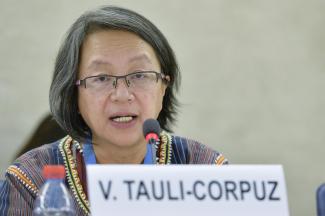
Countless Indigenous Peoples have been divided by imposed State borders, their communities and relatives separated by artificial lines, their migration patterns, sacred rituals, fishing and hunting ways altered. Innumerable Indigenous communities have suffered forced displacement due to conservation efforts, extractive industry operations, political strife, and the impacts of climate change. Every day we hear about Indigenous migrants who are forced to leave their home in search of work because it is no longer viable for them to make a living locally. They flee violence; they flee because they can no longer provide for their families, because their resources are depleted or polluted by large scale agribusiness. To tackle migration and immigration issues, we must reverse the impacts of colonization, decades of neoliberal policies, and the current operations of extractive industries, agro companies, and monocropping that have impoverished Indigenous communities. We must respect, protect, and fulfill Indigenous rights, encouraging the decolonization and support of home communities with sustainable economic opportunities so that people do not have to leave. The following are a few Indigenous voices on these issues. We invite you to listen. To hear the full interviews, visit: cs.org/rights.
Victoria Tauli-Corpuz (Kankanaey Igorot from the Philippines), UN Special Rapporteur on the Rights of Indigenous Peoples
I am from the Cordillera region in the Philippines. There is a lot of out-migration of Indigenous Peoples, whether from their own communities to the urban centers, or out of the country. In the Philippines we have a big number of Indigenous women and men who are outside of the country, mainly because they cannot find jobs in the Philippines. That’s a big issue that has to be addressed. There are multiple factors pushing Indigenous Peoples out of their communities, and these have very serious implications in terms of the strength of the community to be able to continue practicing their cultures and transmit them to the next generation.
In Asia, there are many Indigenous Peoples across national borders. Theoretically we should be able to continue to be mobile and to visit relatives across the border. But that’s where a lot of problems come, because now there are all these so-called antiterror laws where Indigenous Peoples are always suspected of being insurgents or terrorists, and therefore their mobility and their capacity to walk across borders is very much undermined. There should really be no borders as far as Indigenous Peoples are concerned because they existed in those territories before these nation states came into the picture. It is the obligation of nation states to allow for that.
Photo by Jean-Marc Ferré, UN Photo.
